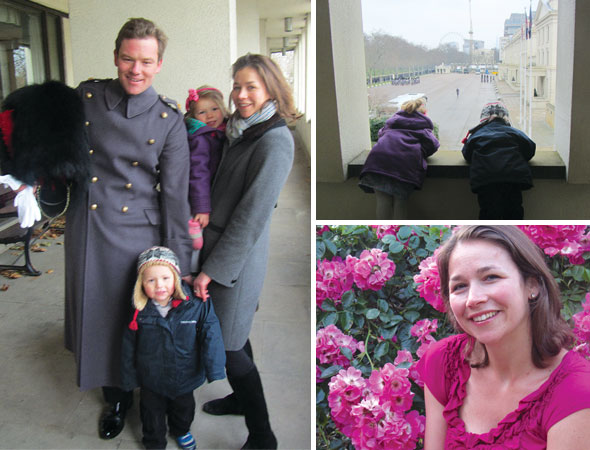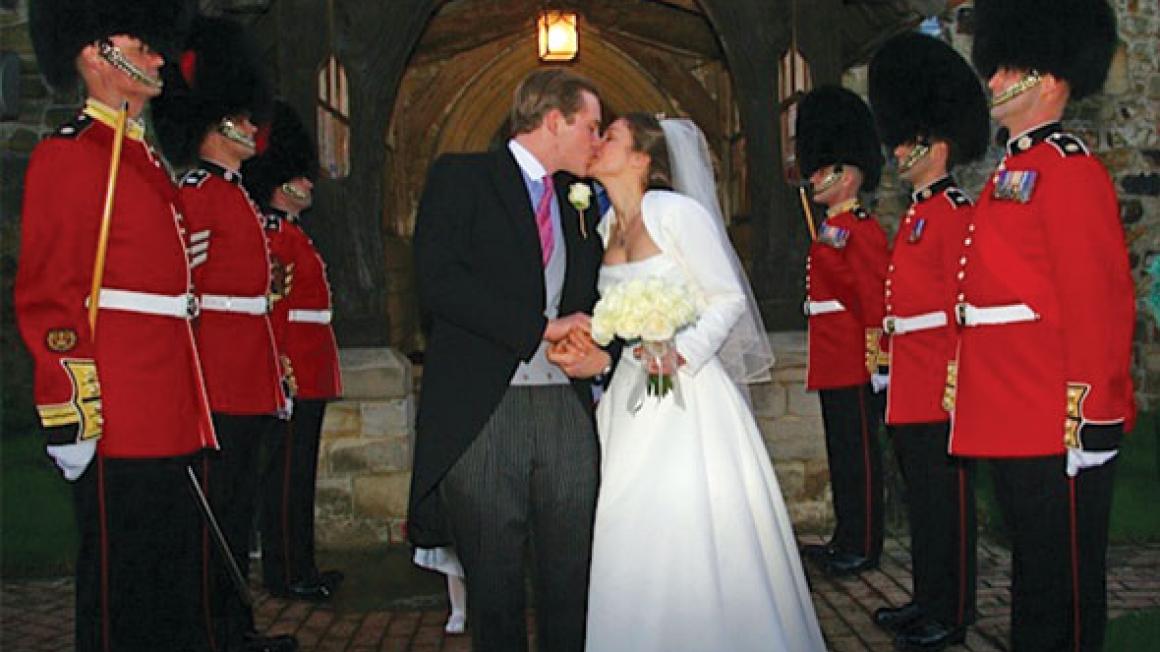My farewell to arms
As if my emotions hadn’t taken enough of a battering that day. On the parade square below, my husband was preparing to mount Queen’s Guard for the last time. My two small children were bellowing from somewhere within their winter coats, ‘Good marching Daddy!’ and my heart was attempting to burst with pride while pulsating to the beat of a rousing number from the band.
Through dribbling mascara I managed to muster up a smile for the guardsman in question, but I wanted to grab him by the arms and say, ‘Thank you’, and then turn to the parade square and yell, ‘Thank you all!’
For after weeks of preparing our family for civvy street, it was only on that austere balcony, faced with that magnificent scene, that I realised the enormity of what we were giving up. We were signing off from an institution that had shaped our lives for more than a decade. All at once, I felt surprisingly grateful, but also sad and nostalgic. And as my husband marched back over to his little fan club and lifted the fringe of his bearskin to flash us all a smile, I could tell his emotions were careering along a similar wave.
Of course, there are many reasons why leaving the army should be cause for celebration: no more operational tours, no more separation and no more sitting at home fearing a fateful knock on the door. The children will be spared the agony of constantly moving schools – and I will get my own house.
But to focus on these new freedoms alone felt wrong; disloyal even. And if there is one thing a military wife knows about it is loyalty. It is not in our training to cut and run. I know how lucky I am to have a husband who is both alive and well. But I also feel duty-bound to pay homage to the positives of army life. For at times, on civvy street, they seem conspicuous by their absence.
Not long after we moved to our lovely new home in the country I opened the fridge to discover too late in the day that I had run out of milk. Back on the patch this would have sparked a quick dash over the road to my friend Ali’s house for fresh supplies. But in my new surroundings, I found myself tucking my children up in bed with bottles of hot squash instead. And when the nappies ran out a few days later, with my now-commuter husband still an hour from home, my son had to go to sleep in a soggy one.
Although it is clear that I need to start writing more eff ective shopping lists, I can’t help but notice the newfound hole in my support network. Who is going to walk my dog when I’m working? Who will I turn to for emergency childcare? Who is going to scale my garden fence in a head torch when I am miles away, panicking that I have left the gas on?

Don’t get me wrong, my new neighbours have been extremely welcoming. But on an army patch, even if you are strangers or have nothing in common, you are bound by a shared mission. As David Cameron would put it, you are ‘all in it together’. In fact, the prime minister’s ‘Big Society’ is alive and kicking on army patches across the country: coffee mornings, free babysitting, book clubs (OK, white-wine clubs), safe stage-managed trick-or-treating, pumpkin-carving competitions, you name it. And with that sense of community comes a security blanket: a guaranteed roof over your head and money in the bank at the end of the month.
One of my friends went as far as to say she felt ‘cradled’ by the army. It mothers you, makes decisions for you, and while that sounds restricting, it can actually be liberating. The army takes care of the bigger picture, dictating where you live, and where your children go to school. It is by general consent that, as you have so little choice in the matter, you may as well sit back and enjoy the ride.
Of course, army living quarters are pretty grim: brown carpets, ceiling lights that look more like giant glass ashtrays, lino that doesn’t quite reach the skirting boards, see-through curtains. But what is so wonderful about enforced bad taste is that there is little pressure to keep up appearances. Instead of wincing under the discerning eye of visiting friends, I could simply blame the army.
I feel somewhat aggrieved that I must now browse soft furnishings websites and read interiors magazines. It is time, after all, that I used to spend with my children. And speaking of my little angels, those brown military carpets were a small mercy during potty training.
Then there was the free maintenance service, although I can hear army wives across the country guffawing at the very suggestion that it might be efficient. In fact, I remember during one coffee morning/moan-in our host spotting an unsuspecting Military Housing Solution representative through the window and hauling him in off the street to answer some of our as-yet unanswered maintenance requests. It was like feeding a lamb to the lions. But I believe the squirrels in the roof of number 39 were evicted soon afterwards. And in my experience, most problems were dealt with efficiently enough.
Certainly, when I found myself in the middle of winter with a broken boiler, a newborn baby, and a husband in Afghanistan, help arrived within a matter of hours. And when I overreacted at what I perceived to be a mini mouse epidemic, pest control was on my doorstep the next day. In general, the chimneys were swept, the hedges were trimmed and the communal lawns were cut. As you can imagine, the novelty of finally being able to do all the above for ourselves is fast wearing thin.
As a product of boarding school, I know what it can be like to leave an institution. You are propelled into a world of competition, rivalry and anonymity, and it is daunting.
For servicemen and servicewomen, especially those who have held rank, there is also a major shift in status. After years of leading soldiers, they are suddenly the new boy or girl in the office, wearing suspiciously shiny shoes. And just as their place in the pecking order shifts, so too does their other half’s.
 Clockwise from left: the family at Jamie's final day in the Queen's Guard; watching Daddy in the Queen's Guard; Georgina
Clockwise from left: the family at Jamie's final day in the Queen's Guard; watching Daddy in the Queen's Guard; GeorginaI am now a wife and mother for the sake of being a wife and mother – and very rewarding it is, too. But in the army I took on both roles for the sake of my country. I know it sounds melodramatic, but when your husband is dealing with the stresses of an operational tour in the heat of the desert, a bad telephone call from a weepy, needy wife can be enough to trigger mistakes in the field. The wives are told as much during pre-tour briefings on so-called Family Days. It was my duty to hold the fort. And on the rare day that I actually managed it, I could allow myself a little self-important pat on the back: a thank you, I would tell myself, from the nation.
And there are other disadvantages of leaving army life. Now that I am firmly rooted in the civilian commuter belt, I am already prompting glazed expressions at social gatherings with tales of train delays and rising ticket prices. No more can I tell stories of my husband’s deployments in exchange for expressions of respect and admiration. And no more free cab rides. (Often taxi drivers picking me up from my patch address would waive the fee with a wink and a ‘tell your man we’re proud of him’.)
Once, during a parade in Windsor to welcome back ‘the boys’ from Afghanistan, I got a tap on the shoulder and a generous, ‘This is for you too, you know’. It was one of the many veterans who turn out to cheer their regiment, come rain or shine.
When you are an army wife, being moved from pillar to post by a husband who never seems to be around, there is much stamping of feet. But small gestures of kindness from strangers never fail to remind you that you are a cog, albeit a tiny one, in a very large, very important machine. And it feels good.
There’s no fanfare when you leave, though. As a ‘dependant’, you clean your quarters, hand over your keys – and that’s it (apart from perhaps one more electricity bill).
For years to come, my husband will join friends and former colleagues at regimental dinners and march through London in a bowler hat on the annual memorial day. My membership, on the other hand, is up – and all that was mine by association has gone. It is not a bitter pill to swallow, merely an unforeseen one.
The next time I take my children to watch the guard mount ahead of the Changing of the Guard at Buckingham Palace, I shall be jostling for a place alongside the railings of Birdcage Walk like every other onlooker and tourist. But as I gaze up at the balcony of the officers’ mess, it won’t be with regret. How could it be?
Some of my friends, after all, have not been so lucky. Their years as army wives ended in tragedy: their husbands were killed. For them, rose-tinted spectacles are a luxury. For their sake, and that of my many friends who continue to wave their husbands off to the frontline, I feel I must embrace my new-found freedom with vigour.
So no regrets: no. A suitcase full of memories: yes. Some truly great friends: absolutely. And an unexpected desire to pay tribute to the institution I served.


